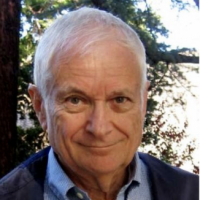
- New Mysteries
- Fast Radio Bursts, FRB’s – 1ms pulses, non‐recurring, which strike the earth at a rate of 5000 per day, and are of unknown orgin – more about this
- Gravitational Waves – detected by LIGO but very coarse directions; need radio or optical observations to locate and understand the orgins
- Recent Nature paper on 78 MHz dip in cosmic background ‐ needs confirmation and theoretical explanation
- Transformational Radio Telescopes – The traditional need for large collecting area and sharp beamwidths needs to be supplemented by telescopes which can find transients from unknown directions in the sky,
- Current example, all the sky, all the time – The Caltech long wavelength array
- DSA, an array to locate and understand the orgins of FRB’s
- Next generation affordable array, 2000 x 5m telescopes.
- Advanced RF Technology for Radio Astronomy and Quantum Computing
- Ultra low noise without cryogenics – 1.4 GHz LNA with 12K noise
- Development of wireless, solar powered, radio telescopes
- LNA requirements for quantum computing – effects of self heating
Sander Weinreb is presently an Emeritus Scientist at JPL and a Visiting Associate at Caltech. He received the B.S.E.E. and Ph.D. degrees from M.I.T. in 1958 and 1963 respectively. Most of his career has been in the administration or development of instrumentation in radio astronomy. His major accomplishments are the introduction of digital correlation techniques into radio astronomy, the discovery of the first cosmic molecular radio spectral line (OH), and the introduction of cryogenic transistor amplifiers to radio astronomy. From 1966 to 1988 he led the Electronic Division of National Radio Astronomy Observatory where he was responsible for the design of all electronics for the Very Large Array and all other telescopes operated by the observatory. Since 2006, Weinreb has devoted most of his effort in developments for the international Square Km Array (SKA) project and mentoring students including the supervision of five Ph.D. students in Electrical Engineering at Caltech. He has over 200 publications, has served on many review and visiting committees, is a Life Fellow of the IEEE and has received the Reber Medal, the Jansky Award, and the Weber Prize for contributions to instrumentation in astronomy.


